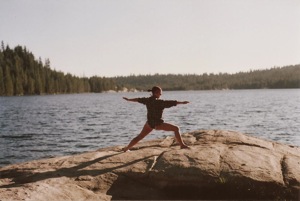 You wake up to find yourself in a small room with gray walls. It’s still dark outside, but the fluorescent lights are blinding. Your back hurts. A guard yells and you scramble off your cot. It’s 6:00 am and time for showers. From the second you wake up until you return to bed, you are told what to do, where to go, and how to act. You are just a number, one of thousands, expected to keep quiet and obey. You are constantly tense and on edge, prepared for violence that could break out at any moment.
You wake up to find yourself in a small room with gray walls. It’s still dark outside, but the fluorescent lights are blinding. Your back hurts. A guard yells and you scramble off your cot. It’s 6:00 am and time for showers. From the second you wake up until you return to bed, you are told what to do, where to go, and how to act. You are just a number, one of thousands, expected to keep quiet and obey. You are constantly tense and on edge, prepared for violence that could break out at any moment.
For millions of Americans serving time in prison, this is their reality. For some, this will be how they spend the rest of their lives. While physical violence is a constant threat, perhaps a more damaging aspect of prison life is the symbolic violence associated with forced subordination. Over time, the dehumanizing effect of life behind bars takes its toll on the psyche. Thanks in part to severe overcrowding over the past few decades, institutions that were originally created as rehabilitation centers for the individual have become containment centers for the masses. Instead of preparing individuals for reentry into society by giving them tools for reform, often prisons simply hold offenders until their time is up, leaving many to walk out in worse condition than before. The problem is not that prisoners lack interest in rehabilitation programs, but that there is a lack of opportunity. Prisoner #1145256 from Coffield Prison in Tennessee Colony, Texas explains his frustration:
“The best thing about prison is that it’s a much-needed time-out. It’s an opportunity for a person to regain their sanity after losing it to drug and alcohol abuse. It’s a good time for someone to regroup and reflect upon who they are and where they are going. Most importantly, I feel, it’s a time to grow morally and spiritually. But instead of offering any real guidance or counseling and dealing with each offender on an individual basis, the system, being so overwhelmed, “panics” and simply assigns a number, letting each person sink or swim.”
In spite of these conditions, many prisoners have found solace in religion, spirituality, and meditation. In 2002, James Fox founded the Insight Prison Project, which offers yoga and meditation at San Quentin State Prison in California. Testimonials from prisoners with whom he has worked show that yoga has helped many of them rediscover a sense of purpose, overcome addiction and better understand the consequences of their actions. It has also helped them find inner peace to help cope with day-to-day violence and negativity that surrounds them.
My personal interest in criminal justice comes from a compassion for people stuck in cycles of social inequality that reinforce patterns of poverty and crime. I strongly believe that rehabilitation is more effective than punishment, and I think yoga can be used as a powerful transformative tool with its ability to both heal and empower. Yoga has been used for decades in therapeutic settings, and a growing number of organizations are using yoga to reach out to at-risk and underserved populations.
Since I began practicing yoga six years ago, it has been a continual source of peace and fulfillment in my life. I have had the opportunity to work with many great instructors who have taught me to be mindful and patient both on and off of the mat. They have also taught me that happiness is achieved through respect for myself and for all beings. Following this philosophy, I believe prisoners deserve the same chance as everyone else to better their lives and to make amends. In the footsteps of James Fox, my goal is to use yoga as a tool to help prisoners restore self-esteem and self-worth in their path toward rehabilitation.
I have chosen to get my 200-hour yoga certification with Doug Swenson because of his holistic approach to yoga. Sadhana Yoga Chi encompasses all aspects of physical and mental health, which are congruent with my goals. For my personal practice, I am also excited for the opportunity to study with such an experienced and dedicated yogi. This yoga teacher training opportunity will give me the tools necessary to give back to those who need it the most.
“Many of us in prison work hard to become better people. This is an absolutely life-changing experience, to say the least; and given the opportunity, we can help many others avoid the same predicament or downfall.” – Prisoner #1145256
Thank you for your support.
2012 Yoga Scholarship Essay
By: Piper Wolfe
If you liked this article and want them to win a free yoga teacher training, then make sure to vote for her by leaving a comment (scroll all the way to the bottom), and sharing this article on Facebook or Twitter. Each comment, Facebook, and Twitter share counts as one vote and you can do all three!
Are you interested in becoming a yoga teacher? Then visit our Yoga School Directory to find the right teacher training. Or, visit our Yoga Retreats page to explore beautiful yoga vacations from around the world.